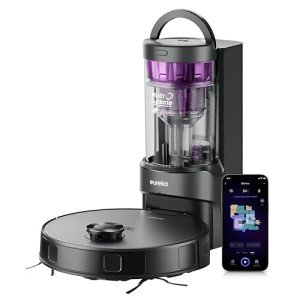Robotic Vacuum Cleaner Comparison: The Future of Home Cleaning
Over the last few years, robotic vacuum cleaners have changed the method we maintain cleanliness in our homes. With developments in technology and the incorporation of synthetic intelligence, these gadgets have actually developed from simple novelty products to essential home devices. This post offers a detailed comparison of some of the leading robotic vacuum on the marketplace, assisting consumers make notified choices when picking a model that matches their needs.
Understanding Robotic Vacuum Cleaners
Robotic vacuum cleaners are self-governing machines developed to tidy floorings instantly. Geared up with sensors, they browse around barriers and adjust their cleaning routes for maximum effectiveness. The essential features that distinguish different designs consist of suction power, battery life, app connectivity, navigation technology, and price.
Secret Features to Consider
When comparing robotic vacuum cleaners, prospective purchasers must take into account the following elements:
- Suction Power: Measured in Pascals (Pa), suction power determines the effectiveness of selecting up dirt and debris.
- Battery Life: The length of time a vacuum can run before requiring a recharge substantially impacts its cleaning performance.
- Navigation Technology: Models might utilize simple random navigation or innovative mapping technologies (like LIDAR) that enable them to produce a map of the home.
- Smart Features: Connectivity to smart device apps or smart home systems can boost use and control.
- Filter Type: HEPA filters are suggested for allergy sufferers, as they trap allergens and enhance air quality.
Comparison of Top Robotic Vacuum Cleaners
Below is a comparison table of some of the very best robotic vacuum cleaners offered in 2023:
| Model | Suction Power (Pa) | Battery Life (min) | Navigation Technology | Smart Features | Price (GBP) |
|---|---|---|---|---|---|
| iRobot Roomba i7+ | 1700 | 75 | Smart mapping | App control, voice command | ₤ 949 |
| Roborock S7 | 2500 | 180 | LIDAR | App control, multi-floor | ₤ 649 |
| Neato D7 | 2000 | 120 | LIDAR | App control, zone cleaning | ₤ 599 |
| Ecovacs Deebot T10 | 3000 | 150 | Smart mapping | App control, space detection | ₤ 799 |
| Shark IQ Robot | 1200 | 90 | Random | App control, self-emptying | ₤ 399 |
Explanation of the Table
- iRobot Roomba i7+: Known for its robust cleaning ability, it features smart mapping innovation that allows it to designate particular locations for cleaning. Its self-emptying function is a plus for benefit.
- Roborock S7: This design stands out in suction power and battery life, making it ideal for bigger homes. Its LIDAR innovation assists create an effective cleaning path, and it can vacuum and mop at the same time.
- Neato D7: The D-shape style permits for much better corner cleaning, and it includes strong suction power. Its LIDAR navigation allows it to map out cleaning locations properly.
- Ecovacs Deebot T10: Boasting the highest suction power and advanced navigation, this design can manage multiple floors effectively. It's a versatile choice for families with differing floor types.
- Shark IQ Robot: An affordable option that still offers smart functions. Its self-emptying ability and app combination make it a practical option for those trying to find a solid cleaning buddy without breaking the bank.
Benefits of Robotic Vacuum Cleaners
Robotic vacuum cleaners provide numerous advantages that add to their increasing popularity amongst customers:
- Time-Saving: Automated cleaning permits users to maximize important time that can be invested in other activities.
- Convenience: Many designs can be scheduled through apps to clean at specific times, reducing manual effort.
- Availability: They can reach under furnishings and in tight spaces where traditional vacuums might struggle.
- Daily Maintenance: Regular usage of robotic vacuums can help preserve a consistently clean environment, promoting much better total home hygiene.
FAQs About Robotic Vacuum Cleaners
1. How frequently should I run my robotic vacuum?
It is recommended to run the robotic vacuum at least 2-3 times a week to preserve cleanliness, though daily use can be helpful, particularly in homes with pets or high foot traffic.
2. Do robotic vacuums work on carpets?
Yes, lots of robotic vacuums are developed to work on carpets, however efficiency might differ based on the model's suction power and brush type. Search for designs specifically discussed as effective for carpets.
3. robot vacuum sale ?
Most robotic vacuums can effectively pick up pet hair, however those with strong suction and tangle-free brush styles are particularly appropriate for this job.
4. How do I keep my robotic vacuum?
Routine upkeep consists of cleaning the brushes and sensors, emptying the dustbin, and sometimes replacing filters to guarantee optimum efficiency.
5. Are robotic vacuums worth the financial investment?
While they tend to be more pricey than standard vacuums, the benefit, efficiency, and time-saving aspects make them a worthy financial investment for many homes.
The marketplace for robotic vacuum cleaners continues to expand as innovation evolves, using consumers a variety of alternatives to fit different cleaning requirements and spending plans. By thoroughly considering functions such as suction power, battery life, and smart capabilities, users can choose a model that lines up with their way of life. Whether for convenience, ease of use, or superior cleaning efficiency, robotic vacuums are undoubtedly reshaping the future of home cleaning.

